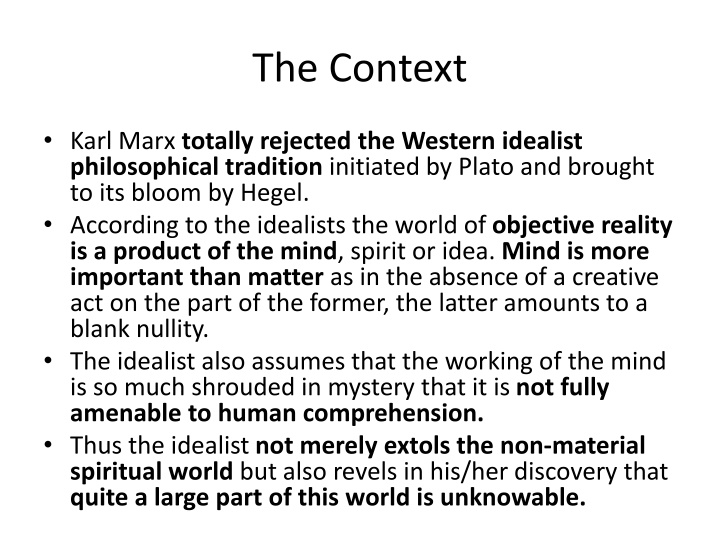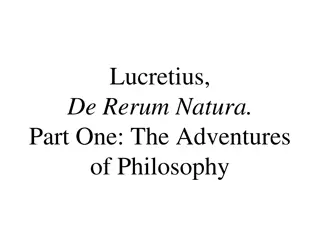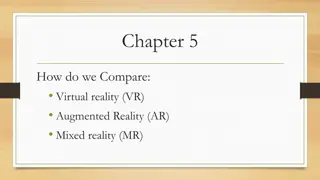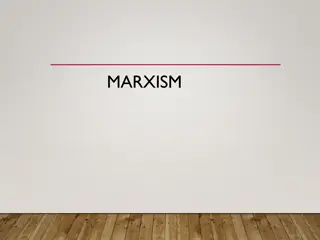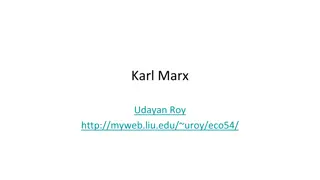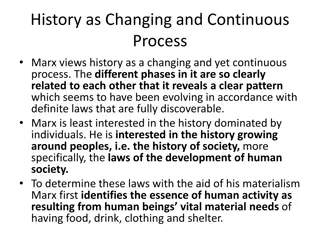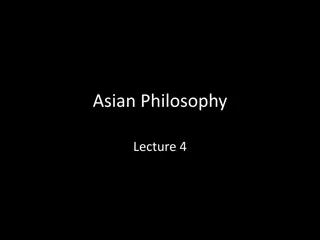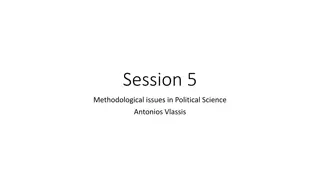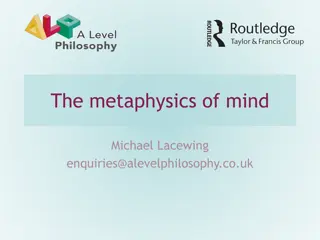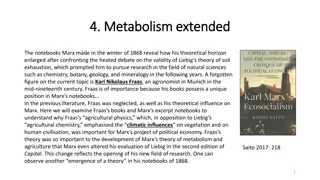Marx's Materialism: Unique Perspectives on Reality
Karl Marx rejected Western idealist philosophy and embraced materialism, emphasizing that matter exists independently of the mind. Unlike previous materialists, Marx's unique features tie materialism to social development, challenging traditional views of permanence in the material world.
Uploaded on Mar 07, 2025 | 3 Views
Download Presentation

Please find below an Image/Link to download the presentation.
The content on the website is provided AS IS for your information and personal use only. It may not be sold, licensed, or shared on other websites without obtaining consent from the author.If you encounter any issues during the download, it is possible that the publisher has removed the file from their server.
You are allowed to download the files provided on this website for personal or commercial use, subject to the condition that they are used lawfully. All files are the property of their respective owners.
The content on the website is provided AS IS for your information and personal use only. It may not be sold, licensed, or shared on other websites without obtaining consent from the author.
E N D
Presentation Transcript
The Context Karl Marx totally rejected the Western idealist philosophical tradition initiated by Plato and brought to its bloom by Hegel. According to the idealists the world of objective reality is a product of the mind, spirit or idea. Mind is more important than matter as in the absence of a creative act on the part of the former, the latter amounts to a blank nullity. The idealist also assumes that the working of the mind is so much shrouded in mystery that it is not fully amenable to human comprehension. Thus the idealist not merely extols the non-material spiritual world but also revels in his/her discovery that quite a large part of this world is unknowable.
Countering Idealism Hence the idealist takes the world as what it is and regards every attempt to change it as impossible and unnecessary. According to Marx, on the contrary, matter is primary and it exists outside and independent of our mind. Thinking or consciousness is not the source of matter. Rather, it is the other way around. All our thinking or thought is only a reflection on matter as it exists on its own. Marx s world is strictly a material world; it is a world where mind, spirit or idea is merely a derivative of matter. Since matter is never rooted in the mysterious movement of the mind there can be nothing in this world that is unknowable. Indeed, the nature of this world and the laws of its development are fully knowable.
Unique Features of Marxs Materialism It would not be proper to state materialism was Marx s unique philosophical invention. There are other philosophers ranging from Bacon to Feuerbach who had developed in their respective ways a materialist view of reality. But Marx s philosophical materialism had some unique features that kept him far away from the erstwhile materialist tradition of Western philosophy. Because of this Marx s materialist philosophy of life became an infallible guide to a programme of action directed to bettering this world of ours.
Unique Features(contd.) Unlike many of the earlier materialist philosophers, Marx does not confine his materialism to a tame settlement of ontological issue regarding the relative primacy of matter and mind. Marx never applies his materialism on an abstract plane. He allows it to be tested bit by bit at the concrete social level. Thus, in Marx materialism does not remain only a philosophical issue but, indeed, becomes a prelude to a theory of social development. Secondly, despite earlier materialism magnifying the importance of matter, it simultaneously spotted in the material world certain permanent or stable things with fixed properties. Implications:
Unique Features(contd.) i. Thus the whole of the world depicted by the earlier materialists was not subject to change. It was not fully materialistic. Despite changes in the material world, the permanence of some of its things must be taken for granted; it made room for eternity and thereby succumbed to a metaphysical bias. Thirdly, earlier materialists admitted that most of the matter was liable to change. But, they always took this change as a result of certain external causes. Thus they did not locate the root of this change in the matter itself. ii.
Earlier Materialism: Mechanical Not Dialectical That is why earlier materialism remained at best a mechanical materialism. The world was conceived of as a machine which can be put to action only by the application of external force and which does not work by virtue of motion inherent in itself. The earlier materialism also further took change as a matter of chance or accident and not as a natural process. This was a kind of materialism with which one could at best interpret the world, but certainly could not try to change it.
Earlier Materialism:(contd.) Marx s purpose was just the reverse as he was more keen on changing the world than on giving a futile philosophical account of it. So he chose to develop his materialism completely on a different line and this he was able to do by coupling his materialism with dialectics.
Laws of Dialectics According to Marx the study and knowledge of the world of matter is possible only with the aid of the laws of dialectics. So the world of matter calls for a dialectical approach and this approach rests on the following principles: i. The first principle of dialectics is that nature is not an agglomeration of unconnected things, that the world is characterized by an interdependence of things. ii. Secondly, since every component of the world is essentially a matter the world is never static but is in a state of continuous movement and change, for there can be no matter without motion or, to put it more precisely, motion is the mode of existence of matter.
Laws of(contd.) Nothing in this world can be treated as permanent and eternal. The world is in a continuous flux; everything in it is changing, developing or dying away. iii. Thirdly, the change that so occurs always implies a qualitative change in a progressive direction. It represents an onward and upward movement a development from the lower to the higher state of things. iv. Fourthly, this development is achieved only through a struggle of opposites. According to Marx, everything embodies an internal contradiction.
Laws of(contd.) Everything has its negative and positive sides in that it represents something which is disappearing and something which is developing and development results from a struggle between these two opposites. And because of this struggle, development is never a simple and smooth affair. It does not proceed in a straight line, but in spirals; it is a development by leaps, catastrophes and revolutions.
Concluding Observations To sum up dialectical materialism sets the perspective of Marx s social and political enquiry. In the first place, it makes clear that Marxian system makes no room for vague and empty ideation. Marx s interest is only in hard matter and nothing beyond it. Secondly, dialectical materialism leads Marx to a position where he will take nothing as permanent and immutable in this world. Everything in this world must undergo a continuous process of change. Further, this change is natural in the sense that it is very much inherent in the very nature of matter. Because matter may achieve its identity only through motion.
Concluding(contd.) What is more, the change is not a mere change in form; it is substantive, qualitative change that naturally follows from the contradictions underlying every matter of this world. Dialectical materialism keeps Marx strictly within the barriers of concrete reality and equips him with enough resources to propagate a theory of radical change. But before Marx applies this theory in his battle with the capitalist society he pauses to apply it on the wide plane of history just to sharpen its edge. This application of dialectical materialism in human society is called historical materialism.
